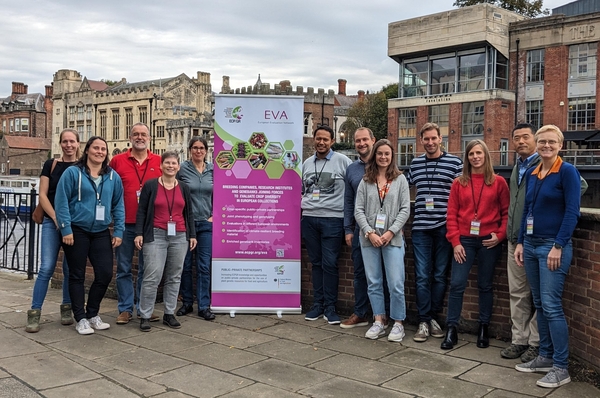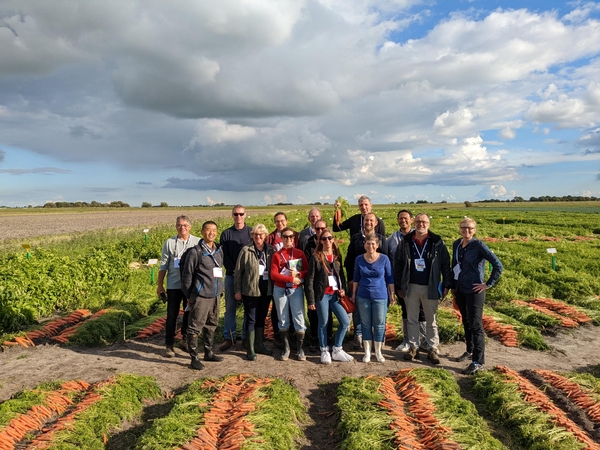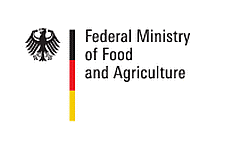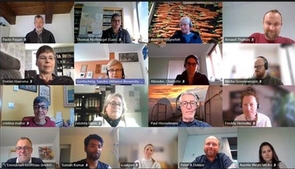EVA Carrot Project meetings
EVA Carrot Annual meeting, 2 October 2023, York, UK

The annual EVA Carrot project meeting was organized on the sidelines of the International Carrot & other Apiaceae symposium and took place on 2 October 2023 in York, UK.
Fourteen project partners gathered to review ongoing data analysis activities. Delphine Hedoin, a master's student supervised by Emmanuel Geoffriau at Institut Agro in Angers, had conducted a thorough statistical analysis of the phenotypic data and her results now feed into the specific questions that other project partners want to address in their analyses. These include looking at the diversity of the EVA collection within the context of other studies, performing detailed analyses of genetic and environmental effects on root, leaf and flowering traits, correlating results from lab and field trials for both morphological and resistance traits, investigating location effects or correlations between C&E data and typology of the carrots in the collection. A publication on the comparison of the different genotyping approaches used in EVA Carrot is in preparation and association studies are ongoing. An additional analysis of volatile compounds in genotyped samples will add additional value to the dataset.
For future collaboration, the network agreed to first focus on valorizing all generated data in the first round, looking also into data from previous projects (EU GENRES Carrot, CarrotDiverse, etc.) in order to connect these. Preparations of a new set of accessions should also include material from new genebank partners, and could be regenerated during 2024, using capacities of both genebanks and companies, in preparation for a new round of evaluations. Additional research partners with specific expertise as well as other companies were also invited to join the EVA Carrot network for a next phase.
A next virtual meeting of the network is planned for spring 2024.
The summary report of the meeting can be found here
EVA Carrot Annual Project meeting, 28–30 September 2022, Warmenhuizen, the Netherlands

Fifteen participants from nine partners of the EVA Carrot network finally met in person for their 2022 annual project meeting. The meeting took place from 28 to 30 September 2022 and was co-hosted by Bejo Seeds in Warmenhuizen, the Netherlands.
Participants presented results from 26 phenotypic evaluation experiments in 11 locations across Europe, which produced over 80,000 individual datapoints. The carrot accessions were genotyped using three different approaches and initial analysis highlights the diversity of the selected plant material. The attendees discussed data analysis approaches and a work plan for the coming year, with a goal to disseminate and exploit the generated data in publications. The network partners were positive to continue their collaboration in an EVA Carrot 2.0 after the end of the currently funded project. In the continuation, the scope of the project may be revised based on findings from this first round of evaluations and the selection of accessions of both wild and cultivated carrots that would make up the next set. Discussions on data analysis and EVA Carrot 2.0 will continue during virtual meetings and a planned next in-person meeting in October 2022, adjacent to the ISHS III International Symposium on Carrot and Other Apiaceae.
Partners also enjoyed a visit to the Bejo seed warehouse and laboratory facilities during the Bejo Open days, which provided an opportunity to look behind the scenes of this world-leading vegetable breeding company.
The meeting report is available [here].
EVA Carrot Annual Project meeting, 20 April 2021 - online
The EVA carrot network met online for their annual meeting on 20 April 2021 to receive updates on activities in 2020 and to discuss open questions and next steps. Twenty participants from the 14 project partners, EURISCO and the ECPGR Secretariat, received updates from the evaluation trials in 2020 and discussed challenges, open questions and next steps for the project. Some partners reported difficulties and delays in their activities due to the Covid-19 pandemic, but overall results from the first trials of 60 carrot accessions and landraces from European gene banks were promising, showing variation in agronomic and biotic stress traits. Comparisons of results from the different geographic locations will provide interesting insight into the effects of climate and environment on the expression of different traits. Adjustments to the protocols and scoring scales for some traits were discussed and relevant amendments will be implemented.
Activities for 2021 include replicates of the field trials in eleven locations from Portugal to Sweden and regeneration of accessions with a view to creating a new set of carrot accessions for evaluations, possible because of an extension of the project until November 2023. All evaluated accessions will be genotyped to allow analyses of diversity and genomic correlations and results will be linked with the CarrotDiverse activity of the Umbellifer crops WG as much as possible. Additional discussions will be necessary on data analyses approaches and the strategic outlook of the project and will hopefully be possible during an in-person meeting in 2022.
Meeting report (168,8 KB)
EVA Carrot Project meeting, 11 May 2020 - virtual meeting
On 11 May 2020, the EVA Carrot network project partners met virtually to receive updates on current activities and discuss open questions and next steps for the project. The 14 participants were informed about activities at Julius-Kühn Institute, where partner Thomas Nothnagel and his team are performing disease assays under controlled conditions. Partners engaged in a general discussion on genotyping strategy, regeneration of accessions and the planning of field trials in 2020, which will mostly take place as planned despite the Covid-19 pandemic and related restrictions.
After a break, the network partners discussed in detail the proposed trial protocol, including experimental design and crop management. They selected traits of interest, which will be scored during the field trials, differentiating between characterization traits and evaluation traits. Partners agreed that characterization traits mainly comprise general descriptors and will be made available without embargo, while evaluation traits are of interest for breeding activities and will remain accessible only to project partners during a three-year embargo before becoming public.
Evaluators in the EVA Carrot network will be starting the evaluation of 60 carrot accessions and landraces from European genebanks in June 2020.

and Agriculture for the period 2019-2024.


